Here are the five officials who will decide the controversial changes to net neutrality rules
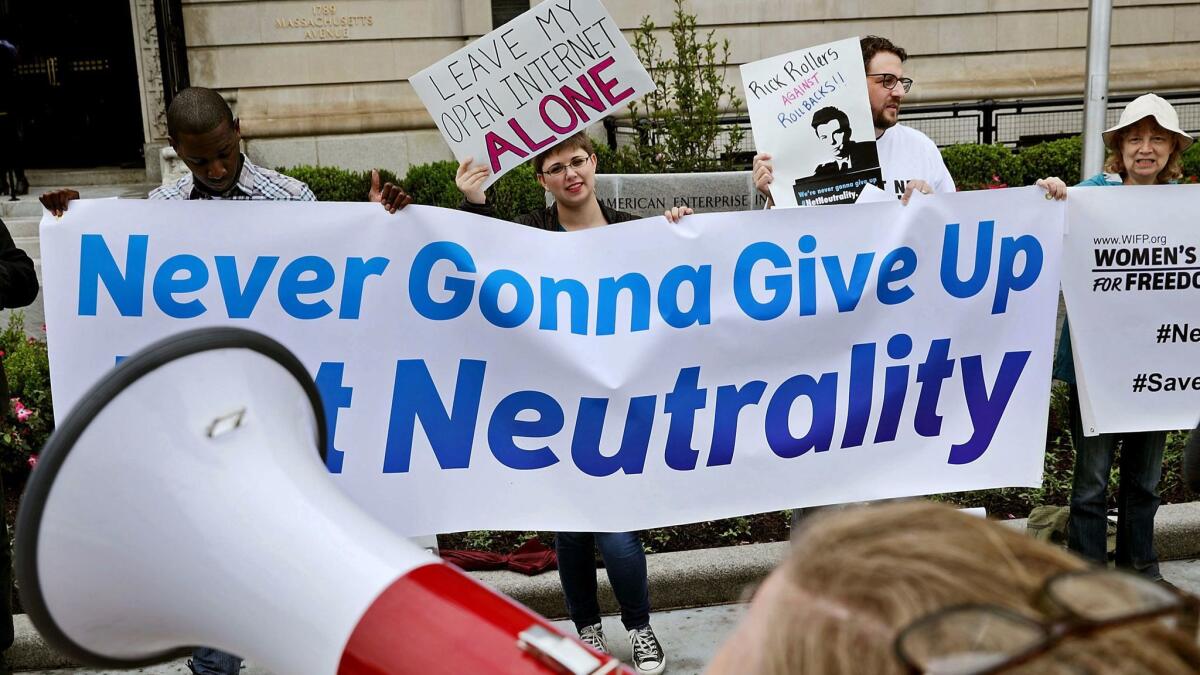
- Share via
The head of the Federal Communications Commission on Wednesday released his detailed proposal to repeal net neutrality rules for online traffic, setting the stage for a vote next month.
Ajit Pai, a Republican tapped by President Trump to take over as the agency’s chairman in January, has been an outspoken opponent of the regulations put in place in 2015 that prohibit internet service providers from blocking websites, slowing connection speeds and charging extra for faster delivery of certain content.
Pai announced Tuesday that he would move to eliminate the rules. His proposal is expected to be approved at a meeting on Dec. 14 by the Republican-controlled FCC.
The agency has been wrestling with the issue since 2003 as it seeks to ensure a vibrant and open online ecosystem without squelching innovation and investment.
Democrats, public interest groups and internet companies such as Google, have advocated for tough government rules to guarantee the unfettered flow of online content. Republicans, free-market advocates and telecommunications companies have opposed the regulations, arguing that the internet flourished without what they call heavy-handed government intervention.
Here are the five commissioners who will decide the latest round of that battle at the FCC’s Dec. 14 meeting.
Ajit Pai
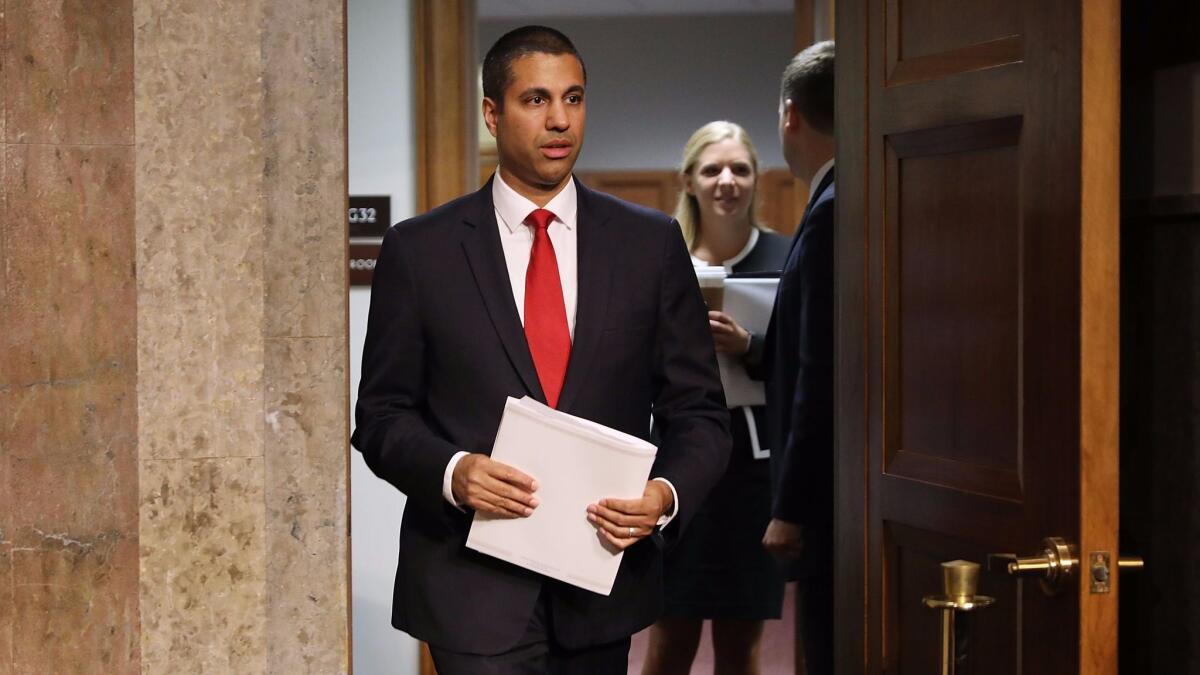
Pai is a telecommunications lawyer who has served on the FCC since 2012.
The son of immigrants from India, he was associate general counsel of Verizon Communications Inc. from 2001 to 2003 before working as a staffer at the U.S. Senate, the Justice Department and the FCC.
Pai was a vocal opponent of the decision by the FCC’s Democratic majority in 2015 to enact the net neutrality rules. He voted against the proposal, which gave the FCC enforcement authority by classifying broadband as a more highly regulated utility-like service under Title 2 of the federal telecommunications law.
After Trump’s election, which allowed Republicans to gain the majority on the FCC after his inauguration, Pai declared he wanted to “fire up the weed whacker” to eliminate burdensome regulations.
Net neutrality was at the top of the list. He proposed a repeal in April, and the FCC voted 2-1 along party lines a month later to begin the process. Now Pai is just weeks away from overturning the rules he voted against in 2015.
“Working with my colleagues, I look forward to returning to the light-touch, market-based framework that unleased the digital revolution and benefited consumers here and around the world,” Pai said Tuesday.
Michael O’Rielly
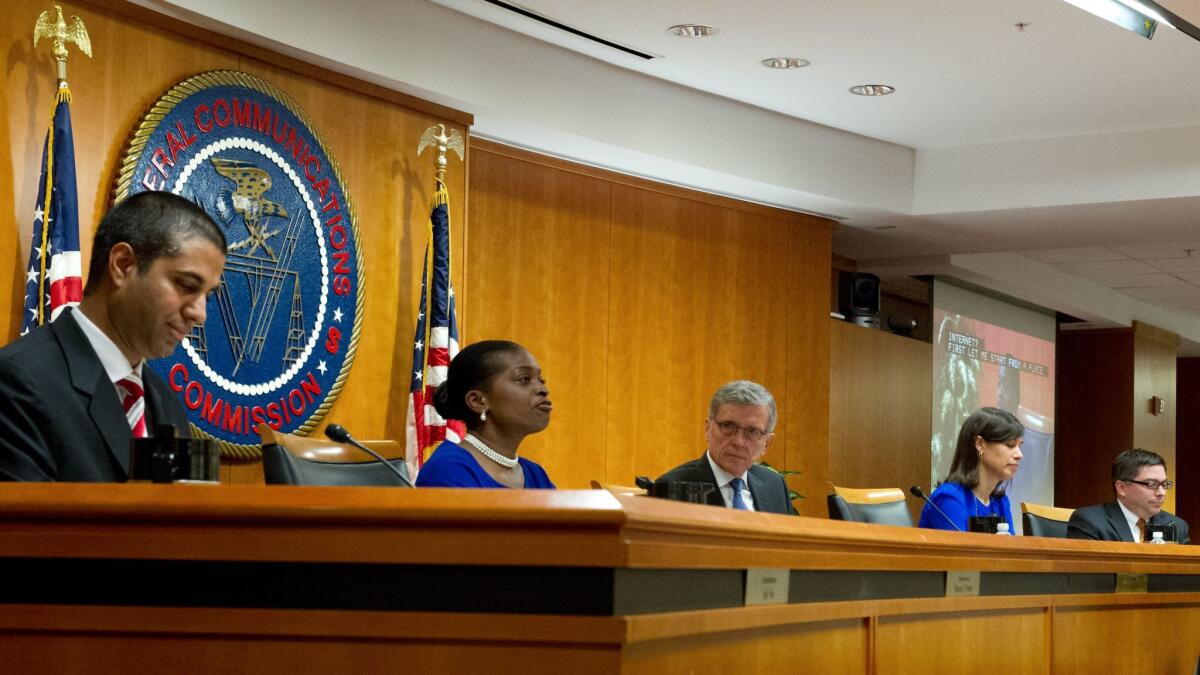
Michael O’Rielly is a Republican and former congressional staffer who has been an FCC commissioner since 2013.
He worked in the House and Senate, rising to policy advisor for Sen. John Cornyn (R-Texas), a member of the Republican’s leadership team, before being nominated for the FCC seat.
O’Rielly also voted against the net neutrality rules in 2015. He has not publicly committed to supporting Pai’s proposal, saying he wanted to review it first to make sure it “contains the necessary legal and analytical foundations.”
But O’Rielly’s comments, and his past positions, indicate he would vote for Pai’s plan.
“The internet was a vibrant place of commerce and public discourse before the rules ever took effect and will continue to flourish after we discard this unnecessary and harmful regulatory overhang,” O’Rielly said Tuesday.
Brendan Carr
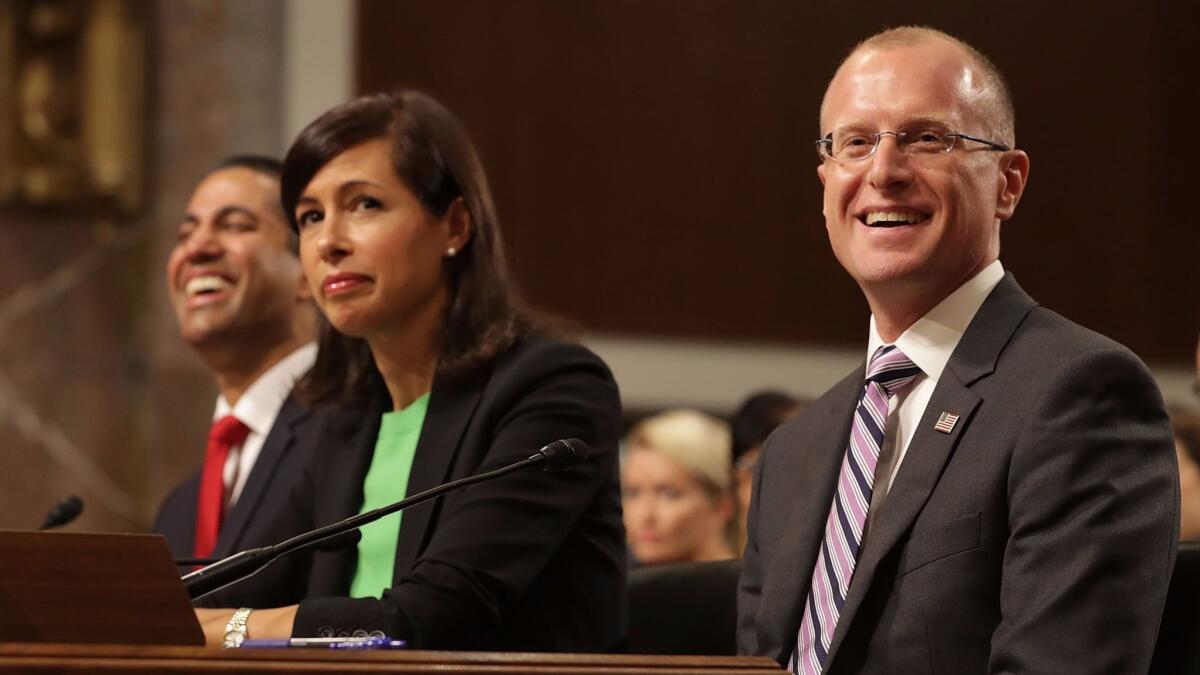
Brendan Carr is the newest Republican on the commission, but he’s not new to the FCC.
Carr, a telecommunications attorney, had spent three years as Pai’s legal advisor for wireless, public safety and international issues. Pai then chose Carr to be the FCC’s general counsel in January.
Trump nominated him for a commission seat in June and he took office in August.
Before joining the FCC, Carr worked as a telecommunications attorney at the Wiley Rein law firm, where his clients included AT&T Inc., Verizon and USTelecom, a broadband industry trade group.
He’s an ally of Pai and said Tuesday he “fully supported” the chairman’s proposal to return to the pre-2015 regulatory framework
“The internet flourished under this framework,” Carr said. “I look forward to casting my vote in support of internet freedom.”
Mignon Clyburn
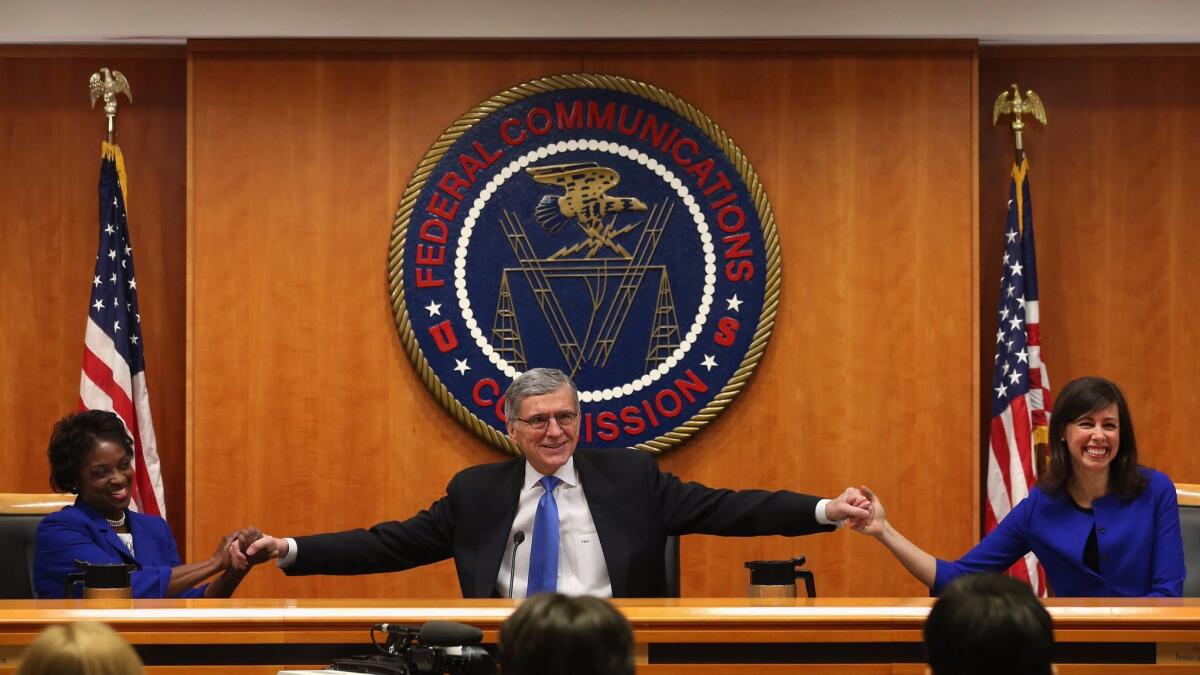
Mignon Clyburn, a Democrat, is the longest-serving member of the FCC.
A former member of the Public Service Commission of South Carolina, Clyburn joined the FCC in 2009. She served as acting chairwoman of the FCC for about six months in 2013.
She is a strong supporter of the tough net neutrality rules and joined with former Chairman Tom Wheeler and Commissioner Jessica Rosenworcel — all Democrats — to approve them in 2015.
She blasted Pai’s proposal on Tuesday, calling it “a giveaway to the nation’s largest communications companies, at the expense of consumers and innovation.”
Jessica Rosenworcel
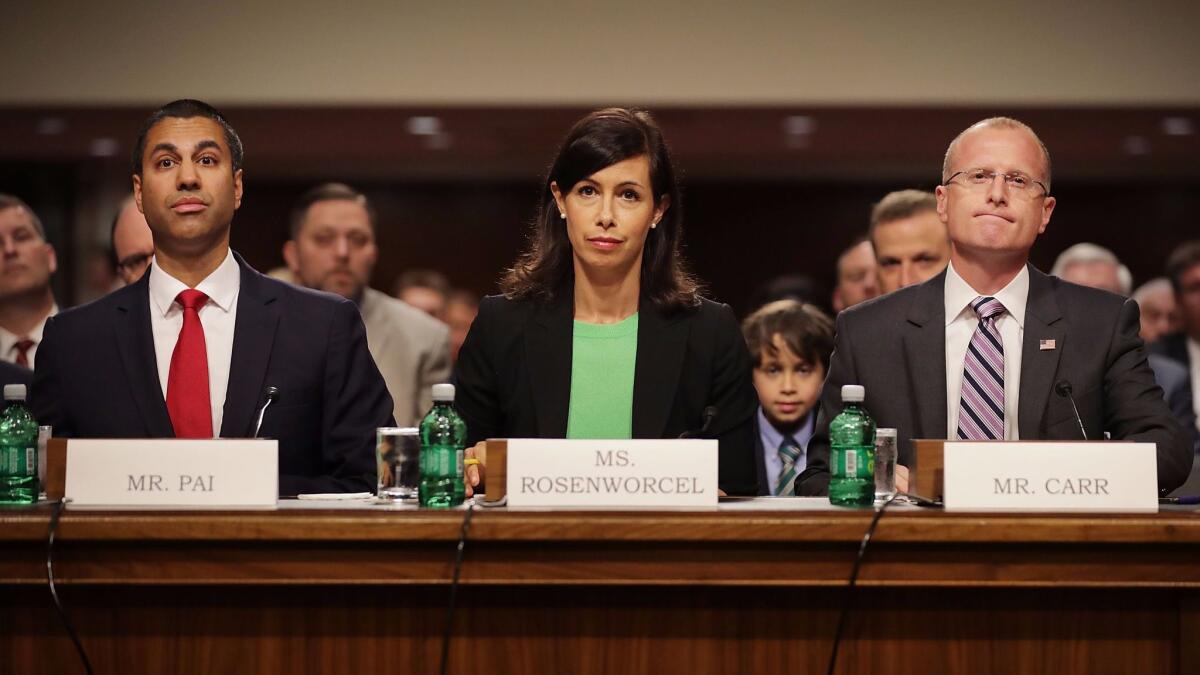
Jessica Rosenworcel, a Democrat, returned to the commission in August after political complications in the Senate led to her first term expiring in January.
A former FCC staffer and then senior communications counsel for the Senate Commerce committee, Rosenworcel first became a commissioner in 2012. Trump nominated her in June to fill a Democratic seat. She was sworn in Aug. 11, the same day as Carr.
Rosenworcel is another backer of the existing net neutrality rules, having voted for them in 2015.
She’s expected to vote against Pai’s plan, which she called “ridiculous and offensive to the millions of Americans who use the internet every day.”
Rosenworcel wants public hearings on the proposal, but none are planned before the Dec. 14 vote.
“Our internet economy is the envy of the world because it is open to all,” Rosenworcel said Tuesday. “This proposal tears at the foundation of that openness.”
Twitter: @JimPuzzanghera
ALSO
Michael Hiltzik: The FCC's abandonment of network neutrality will end the internet as we know it
Net neutrality rules targeted for repeal by FCC chairman
A brief, strange history of net neutrality (including a 'series of tubes,' a dingo and James Harden)
Inside the business of entertainment
The Wide Shot brings you news, analysis and insights on everything from streaming wars to production — and what it all means for the future.
You may occasionally receive promotional content from the Los Angeles Times.








